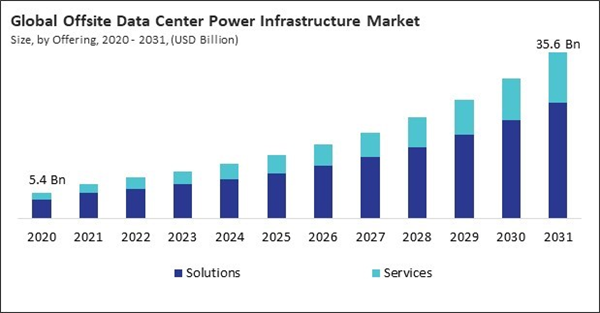The Asia Pacific region recorded a strong growth in 2023. This strong growth can be attributed to the rapid expansion of digital economies in countries like China, India, and Japan, where increased internet penetration, cloud adoption, and the rise of e-commerce drive demand for data centers. Also, the Asia Pacific region would acquire nearly 30% of the total market share by 2031.
The shift towards cloud computing and colocation services has become a significant force driving the growth of this power infrastructure. Simultaneously, colocation services are crucial in shaping the offsite data center landscape. Colocation allows businesses to rent physical space, network bandwidth, and power from third-party providers instead of maintaining their data centers. Hence, the growing reliance on cloud computing and colocation services drives the need for larger, more energy-efficient data centers, pushing demand for innovative power infrastructure solutions.
Additionally, the expansion of edge computing is rapidly transforming the data processing and storage landscape, significantly impacting the demand for specialized power infrastructure. This shift towards processing data at the edge has led to the proliferation of smaller, distributed data centers, often called edge data centers. Thus, the rise of edge computing is driving a fundamental shift in data center power infrastructure requirements.
However, Establishing and maintaining data centers involves considerable financial outlay, particularly in building the power infrastructure necessary to support these facilities. Additionally, the rapid evolution of data center technologies places ongoing pressure on organizations to invest in upgrades. Power infrastructure must be constantly updated to meet the increasing demands for processing power, energy efficiency, and sustainability. Hence, high capital expenditure is one of the most significant barriers to expanding the market.
The leading players in the market are competing with diverse innovative offerings to remain competitive in the market. The above illustration shows the percentage of revenue shared by some of the leading companies in the market. The leading players of the market are adopting various strategies in order to cater demand coming from the different industries. The key developmental strategies in the market are Acquisitions, and Partnerships & Collaborations.
Driving and Restraining Factors
Drivers
- Shift towards cloud computing and colocation services
- Expansion of edge computing
- Global expansion of IT infrastructure
Restraints
- Substantial upfront costs associated with building and maintenance
- Growing prevalence of cyberattacks targeting critical infrastructure
Opportunities
- Increased reliance on real-time analytics and AI
- Resilience against natural disasters and downtime
Challenges
- Uncertainty around long-term energy supply
- Limited access to land and resources
Vertical Outlook
On the basis of vertical, the market is classified into BFSI, IT & telecom, media & entertainment, healthcare, government & defense, retail, manufacturing, and others. The IT & telecom segment recorded 20% revenue share in the market in 2023. Increased demand for high-speed connectivity, 5G technology, and the rapid expansion of cloud services were the primary factors driving this growth.Offering Outlook
Regional Outlook
Region-wise, the market is analyzed across North America, Europe, Asia Pacific, and LAMEA. The North America segment acquired 36% revenue share in the market in 2023. The region's well-established data center industry, particularly in the United States, continues to expand as cloud computing giants, colocation providers, and enterprises invest in new data centers and power upgrades.List of Key Companies Profiled
- ABB Group
- Schneider Electric SE
- Eaton Corporation plc
- Huawei Technologies Co., Ltd. (Huawei Investment & Holding Co., Ltd.)
- Johnson Controls International PLC
- Delta Electronics, Inc.
- Altron a.s.
- Vertiv Holdings Co.
- Hubbell Incorporated
Market Report Segmentation
By Offering
- Solutions
- Services
By Vertical
- BFSI
- IT & Telecom
- Retail
- Media & Entertainment
- Manufacturing
- Healthcare
- Government & Defense
- Others
By Geography
- North America
- US
- Canada
- Mexico
- Rest of North America
- Europe
- Germany
- UK
- France
- Russia
- Spain
- Italy
- Rest of Europe
- Asia Pacific
- China
- Japan
- India
- South Korea
- Singapore
- Malaysia
- Rest of Asia Pacific
- LAMEA
- Brazil
- Argentina
- UAE
- Saudi Arabia
- South Africa
- Nigeria
- Rest of LAMEA
Table of Contents
Companies Mentioned
- ABB Group
- Schneider Electric SE
- Eaton Corporation plc
- Huawei Technologies Co., Ltd. (Huawei Investment & Holding Co., Ltd.)
- Johnson Controls International PLC
- Delta Electronics, Inc.
- Altron a.s.
- Vertiv Holdings Co.
- Hubbell Incorporated











